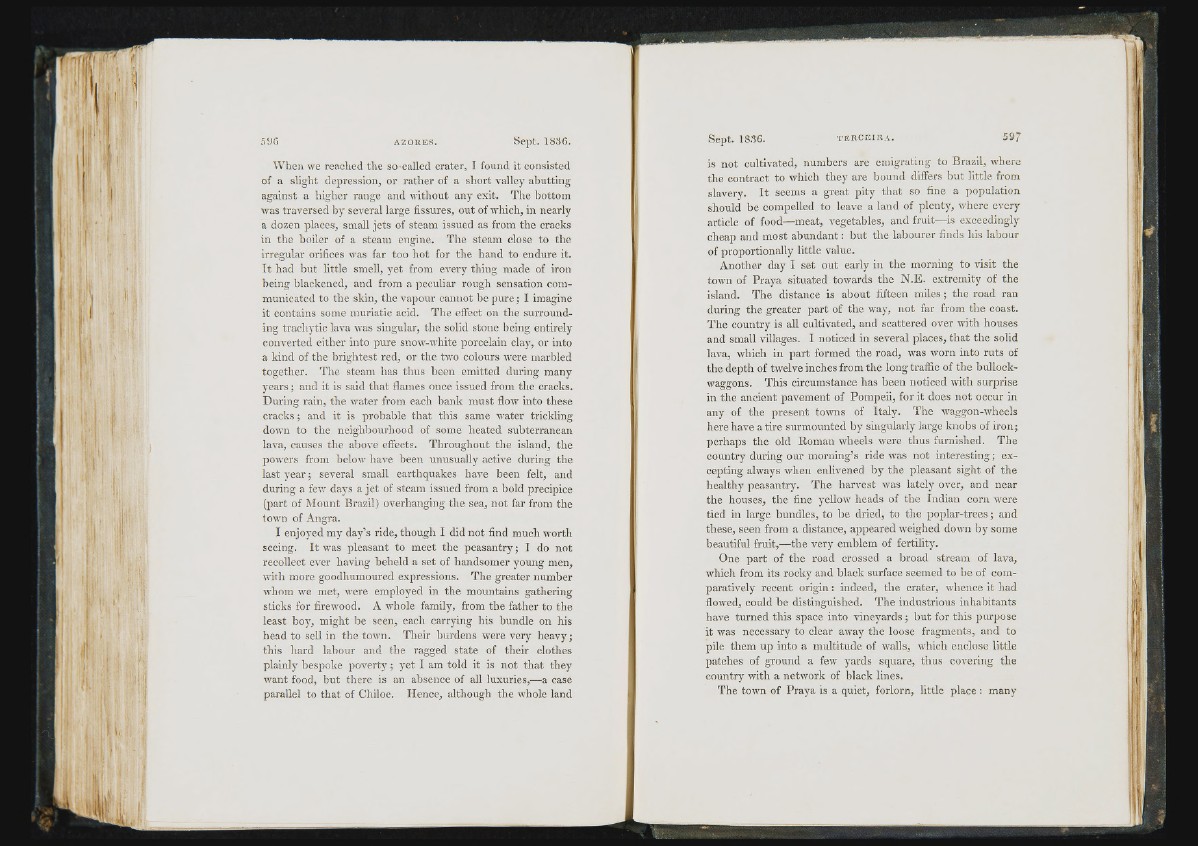
r
i’
i . f
When we reached the so-called crater, I found it consisted
of a slight depression, or rather of a short valley abutting
against a higher range and without any exit. The bottom
was traversed by several large fissures, out of which, in nearly
a dozen places, small jets of steam issued as from the cracks
in the boiler of a steam engine. The steam close to the
irregular orifices was far too hot for the hand to endure it.
It had but little smell, yet from every thing made of iron
being blackened, and from a peculiar rough sensation communicated
to the skin, the vapour cannot be pure; I imagine
it contains some muriatic acid. The effect on the surrounding
trachytic lava was singular, the solid stone being entirely
converted either into pure snow-white porcelain clay, or into
a kind of the briglitest red, or the tivo colours were inarlrled
together. The steam has thus been emitted during many
years; and it is said that flames once issued from the cracks.
During rain, the water from each bank must flow into these
cracks; and it is probable that this same water trickling
down to the neighbourhood of some heated subterranean
lava, causes the above effects. Throughout the island, the
powers from below have been unusually active during the
last year; several small earthquakes have been felt, and
during a fev,- days a jet of steam issued from a bold precipice
(part of Mount Brazil) overhanging the sea, not far from the
town of Angra.
I enjoyed my day’s ride, though I did not find much worth
seeing. It was pleasant to meet the peasantry; I do not
recollect ever having beheld a set of handsomer young men,
with more goodhumoured expressions. The greater number
whom we met, were employed in the mountains gathering
sticks for fireivood. A whole family, from the father to the
least boy, might be seen, each carrying his bundle on his
head to sell in the town. Their burdens were very heavy;
this hard labour and the ragged state of their clothes
plainly bespoke poverty; yet I am told it is not that they
want food, but there is an absence of all luxuries,—a case
parallel to that of Chiloe. Hence, although the whole land
Sept. 1836. T ER CE I I I A .
is not cultivated, numbers are emigrating to Brazil, where
the contract to which they are bound differs but little from
slavery. It seems a great pity tliat so fine a population
should be compelled to leave a land of plenty, where every
article of food—meat, vegetables, and fruit—is exceeding!)'
cheap and most abundant: but the labourer finds his labour
of proportionally little value.
Another day I set out early in the morning to visit the
town of Praya situated towards the N.E. extremity of the
island. The distance is about fifteen miles; the road ran
during the greater part of the way, not far from the coast.
The country is all cultivated, and scattered over with houses
and small villages. I noticed in several places, that the solid
lava, which in part formed the road, was worn into ruts of
the depth of twelve inches from the long traffic of the bullock-
waggons. This circumstance has been noticed with surprise
in the ancient pavement of Pompeii, for it does not occur in
any of the present towns of Italy. The waggon-wheels
here have a tire surmounted by singularly large knobs of iron;
perhaps the old Roman wheels were thus furnished. The
country during our morning’s ride was not interesting; excepting
always when enlivened by the pleasant sight of the
healthy peasantry. The harvest was lately over, and near
the houses, the fine yellow heads of the Indian corn were
tied in large bundles, to be dried, to the poplar-trees; and
these, seen from a distance, appeared weighed down by some
beautiful fruit,—the very emblem of fertility.
One part of the road crossed a broad stream of lava,
which from its rocky and black surface seemed to be of comparatively
recent origin: indeed, the crater, whence it had
flowed, could be distinguished. The industrious inhabitants
have turned this space into vineyards; but for this purpose
it was necessary to clear away the loose fragments, and to
pile them up into a multitude of walls, which enclose little
patches of ground a few yards square, thus covering the
country with a network of black lines.
The town of Praya is a quiet, forlorn, little place ; many
i ■